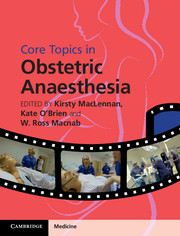Book contents
- Frontmatter
- Contents
- List of contributors
- Preface
- Section 1 Basic science, epidemiology and service organization
- Section 2 Obstetric aspects
- Section 3 Provision of anaesthesia
- Section 4 Medical conditions in pregnancy
- Section 5 Postpartum complications and obstetric emergencies
- Section 6 Service organization
- 27 Multidisciplinary teaching and training on the delivery unit
- 28 Clinical governance and patient safety
- 29 Ethics, consent and the law
- Index
- Plate section
- References
29 - Ethics, consent and the law
from Section 6 - Service organization
Published online by Cambridge University Press: 05 December 2015
- Frontmatter
- Contents
- List of contributors
- Preface
- Section 1 Basic science, epidemiology and service organization
- Section 2 Obstetric aspects
- Section 3 Provision of anaesthesia
- Section 4 Medical conditions in pregnancy
- Section 5 Postpartum complications and obstetric emergencies
- Section 6 Service organization
- 27 Multidisciplinary teaching and training on the delivery unit
- 28 Clinical governance and patient safety
- 29 Ethics, consent and the law
- Index
- Plate section
- References
Summary
Introduction
Obstetric anaesthesia poses a convergence of all the ethical and consensual dilemmas only encountered infrequently in other areas of anaesthetic practice. The patient population typically ranges from teenagers upwards, with varying degrees of capacity to consent, a varying level of understanding and information provision, but a universally high degree of expectation. Patients can present in a time-critical manner and the treatment of the mother or the baby may cause risk to one to save the other. The anaesthetist, however, is well placed to provide a unifying voice of reason in this difficult arena. Therefore it is incumbent on us to have a good grasp of all the pertinent issues. This chapter will cover the issues of consent in the obstetric population, the legal background which underpins our current situation, and finally the ethical controversy that surrounds pregnancy testing in the under-16s.
Consent
We perform consent for a number of reasons: ethical, legal and regulatory body requirements.
Ethical considerations
Ethically there are a couple of underlying principles which govern our actions in this area. The Select Committee of Medical Ethics ruled in their report in 1994 that:
Alongside the principle that human life is of special value, the principle is widely held that an individual should have some measure of autonomy to make choices about his or her life … As the law stands medical treatment may be given to competent adult patients only with their informed consent, except in an emergency.
Making your own decisions, whether this involves consenting or withholding consent, of itself promotes welfare. Seeking consent helps to establish trust between the doctor and patient, and actively involves the patient in their own care. The requirement of consent therefore promotes individual autonomy and encourages rational decision-making. These derive from the basic principle of the right to self-determination, complemented by the principle of respect for persons.
Legal considerations
The Department of Health has released the Reference Guide to Consent for Examination or Treatment (2009), which provides a guide to the legal framework that all health professionals need to take account of in obtaining valid consent for any examination, treatment or care that they propose to undertake. It stems from the case law that exists within English law and from Court of Appeal judgements, as well as the European Court of Human Rights.
- Type
- Chapter
- Information
- Core Topics in Obstetric Anaesthesia , pp. 225 - 231Publisher: Cambridge University PressPrint publication year: 2015



